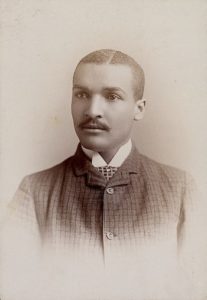
John Westley Gilbert
*John Wesley Gilbert was born on this date in 1863. He was a Black archaeologist, educator, and missionary to the Congo.
Gilbert was born enslaved in Hephzibah, Georgia, though he grew up near Augusta. He was named after John Wesley, the founder of Methodism. Until he left Georgia, Gilbert "spent half the year on the farm and the other half in the public schools of Augusta." After finishing public school, Gilbert enrolled in the Augusta Institute (later the Atlanta Baptist Seminary, a predecessor of Morehouse College).
In 1884, he enlisted in the newly opened Paine Institute (later known as Paine College), which had been established as an "interracial" venture between the Methodist Episcopal Church, South (MECS), and the Colored Methodist Episcopal Church (CME). George Williams Walker, the MECS minister and president of Paine from 1884–1910, became a lifelong mentor to Gilbert; upon Walker's death in 1911, Gilbert wrote to Walker's widow that "Dear Dr. Walker…was as much of a father to me as he was a husband to you."
In 1886, Gilbert was given financial assistance to transfer into the junior class of Brown University. He was among the first ten Black students to attend the school and among the forty Blacks to graduate from any northern university between 1885 and 1889. Gilbert received his bachelor's degree from Brown in 1888. He then moved back to Georgia, where 1889 he married Osceola Pleasant, a graduate of Fisk University and the Paine Institute.
While at Brown, Gilbert received a scholarship to attend the American School of Classical Studies in Athens, Greece. He was the first Black to participate in that school and was given an award for "excellence" in Greek. From 1890-1891 and conducted archaeological excavations on Eretria with John Pickard, producing the first map of Ancient Eretria. In 1891, Gilbert returned to Augusta, Georgia, and began to teach Greek, French, German, Latin, and Hebrew at Paine College.
His appointment caused an uproar as the first Black faculty member at Paine. Other faculty decried "the evil" of this "revolutionary measure." His work was also crucial because of his classical education: as a Paine professor later put it, "This was to be a college, and to be a college, you had to teach Greek and Latin." Students later recalled that he was "an exacting teacher" who "would not tolerate weak excuses" since "he knew from personal experience that only diligence and plain hard work produced scholars." He supposedly said: "If you want to realize your importance, put your finger in a bowl of water, take it out, and look at the hole."
In 1913, Gilbert was appointed the president of Miles College. He served in that post for one year before returning to Paine College. In 1911 and 1912, Gilbert undertook a mission to the Belgian Congo with Walter Russell Lambuth, a (white) bishop of the Methodist Episcopal Church.
Lambuth and Gilbert cooperated well. Gilbert's passion for languages and sense of the "Southern Negro's debt and responsibility to Africa" even led him to compile a vocabulary and grammar for Tetela, a language spoken in their work. Gilbert and Lambuth established a church and school in the village of Wembo-Nyama. This school would later educate Patrice Lumumba, the first prime minister of the Democratic Republic of the Congo and a student of anticolonialism and pan-Africanism.
In its current form as the Patrice-Emery-Lumumba University of Wembo-Nyama, this school is supported by American Methodists to this day. Gilbert and Lambuth's mission was an exemplar of an interracial partnership. However, initially, there were "persistent rumors that the Belgian government was not highly cordial to Gilbert's return." Rather than a joint mission of the (black) CME and (white) MECS, by the 1920s and 30s, the Methodist missionaries in Wembo-Nyama were exclusively white. Sylvia Jacobs argues that "probably the greatest obstacle was the Belgian government, which refused to issue permits to African Americans seeking to reside in the Belgian Congo" because of prior agitation against Belgian atrocities.
Gilbert's beliefs in interracial partnership were controversial at the time. W. E. B. Du Bois criticized his political views. But he had an immensely positive influence as an educator and a role model from Augusta, John Hope. Gilbert was ill by 1921 and died in Augusta, Georgia, on November 18, 1923. Soon after his death, The Spirit of John Wesley Gilbert was published as a eulogy. The author outlined the "Gilbert program … in the following sentences: No two races can live together, interlarded, under the same laws, but with different race marks and proclivities, in anything like peace without a program of 'goodwill' and interracial understanding."
Paine College dedicated a chapel to honor him and Bishop Lambuth in 1968. 1941, Augusta built a low-income housing complex across the street from Paine College. In honor of Gilbert, the complex was named Gilbert Manor. The housing was closed in 2008 to make room for the expansion of the Medical College of Georgia. In 2020, the American School of Classical Studies at Athens named the newly renovated Student Center after Gilbert. A comprehensive biography of Gilbert's life and work was published in January 2022, titled The First Black Archaeologist: A Life of John Wesley Gilbert by John W. I. Lee.